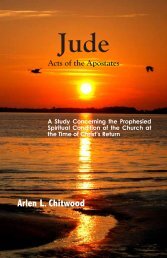Signs in John's Gospel - The Lamp Broadcast
Signs in John's Gospel - The Lamp Broadcast
Signs in John's Gospel - The Lamp Broadcast
You also want an ePaper? Increase the reach of your titles
YUMPU automatically turns print PDFs into web optimized ePapers that Google loves.
<strong>The</strong> Resurrection of Lazarus 183<br />
followed by heal<strong>in</strong>g, would then be followed by the entire nation<br />
proclaim<strong>in</strong>g the same message to the Gentile world which this<br />
man had proclaimed to the religious leaders <strong>in</strong> Israel (vv. 17, 25,<br />
27, 30; cf. Isa. 53:1ff).<br />
And the seventh sign, the resurrection of Lazarus <strong>in</strong> chapter<br />
eleven, shows exactly the same th<strong>in</strong>g. Though there is noth<strong>in</strong>g recorded<br />
concern<strong>in</strong>g anyth<strong>in</strong>g Lazarus may have said follow<strong>in</strong>g his<br />
resurrection, the sign itself, as the previous sign, spoke volumes<br />
concern<strong>in</strong>g the matter at hand.<br />
This sign foreshadowed life be<strong>in</strong>g given to the entire nation<br />
relative to the same th<strong>in</strong>g seen <strong>in</strong> a foreshadow<strong>in</strong>g of sight be<strong>in</strong>g<br />
given to the nation <strong>in</strong> the previous sign. Lazarus be<strong>in</strong>g <strong>in</strong> the<br />
place of death for four days foreshadowed Israel be<strong>in</strong>g <strong>in</strong> the place<br />
of death for 4,000 years. And Lazarus be<strong>in</strong>g raised follow<strong>in</strong>g four<br />
days foreshadowed Israel be<strong>in</strong>g raised follow<strong>in</strong>g 4,000 years.<br />
In John chapter n<strong>in</strong>e, the religious leaders <strong>in</strong> Israel cast out the<br />
man whose sight had been restored. In the Greek text there is a<br />
double use of “without,” or “on the outside.” <strong>The</strong> thought brought<br />
over <strong>in</strong>to English would be, “<strong>The</strong>y cast him out [out from the place<br />
where they resided], <strong>in</strong>to a place on the outside [separate from the<br />
place where they resided],” with the text plac<strong>in</strong>g an emphasis on<br />
the latter — the place outside.<br />
(In a respect, this would be similar to the expression, “the outer<br />
darkness” <strong>in</strong> Matt. 8:12; 22:13; 25:30. <strong>The</strong> structure of the Greek text, <strong>in</strong><br />
all three <strong>in</strong>stances <strong>in</strong> Matthew’s gospel, literally reads, “the darkness,<br />
the outer,” with the emphasis placed on the thought of “outer.” <strong>The</strong>n,<br />
with the repetition of the article before “outer,” the reference is not to<br />
just any darkness but to a particular darkness outside of a realm of light.<br />
And the thought is somewhat the same with the double use of<br />
“without,” or “on the outside” <strong>in</strong> John 9:34. It was not just any place<br />
<strong>in</strong>to which the man was cast, but a place outside of where the religious<br />
leaders resided [outside of any affiliation with the religious life of Israel<br />
— outside of the synagogue, etc.])<br />
And, follow<strong>in</strong>g Lazarus’ resurrection, the religious leaders <strong>in</strong><br />
Israel sought not only to slay the One Who had raised Lazarus<br />
(11:53) but they even sought to slay Lazarus himself (12:10).



